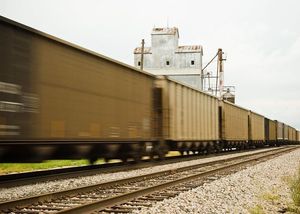Potential Rail Merger Would Impact Agriculture Shipments
 The proposed $85 billion merger between Union Pacific and Norfolk Southern would create the first coast-to-coast railroad. This would reshape the U.S. freight network by combining 50,000 miles of track.
The proposed $85 billion merger between Union Pacific and Norfolk Southern would create the first coast-to-coast railroad. This would reshape the U.S. freight network by combining 50,000 miles of track.
Mike Steenhoek of the Soy Transportation Coalition calls the deal a “seismic event” for the transportation sector, noting both potential benefits and drawbacks for agriculture.
Fewer rail handoffs could increase efficiency and lower some costs, but Steenhoek warns that reduced competition could lead to higher rates and lower service quality for farmers. This could potentially depress grain prices.
Steenhoek suggests the timing reflects a politically favorable climate for such deals. He also warns that this could trigger further consolidation and possibly reduce the U.S. rail industry to just two coast-to-coast carriers.
Ag industry reactions are mixed. Agricultural Retailers Association president and CEO Daren Coppock said ARA is committed to ensuring that any outcome protects and enhances shippers’ rights while guaranteeing affordable, reliable, and safe rail service for America’s agricultural retailers, farmers, ranchers, and their rural communities. National Grain and Feed Association president and CEO Mike Seyfert added NGFA looks forward to learning how the railroads’ merger will create resilient and reliable efficiencies and incentives in timeliness of service and deliveries, along with fair and reasonable rates.
The American Chemistry Council opposes the merger, citing concerns over reduced competition and worsening service. Final approval could take up to three years, and opposition remains strong among key stakeholders.
Read more on the potential rail merger impact on agriculture here.
